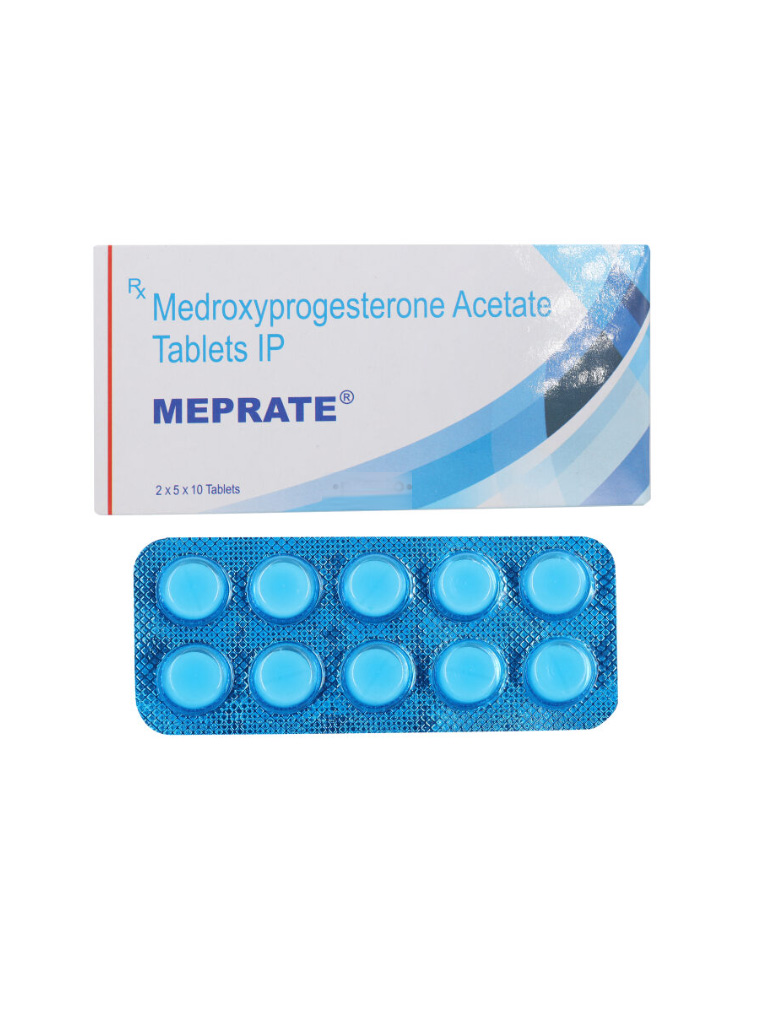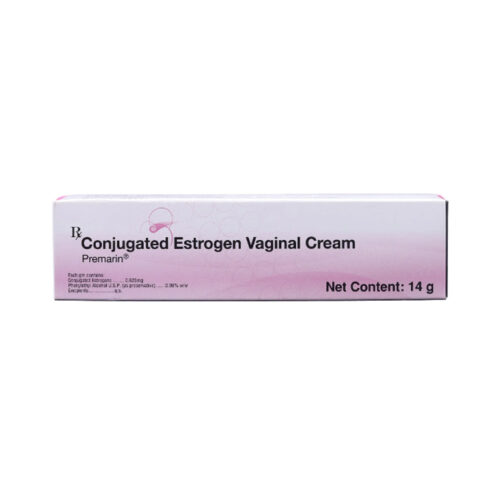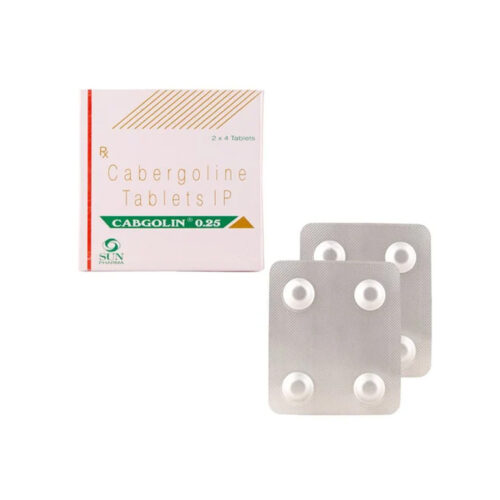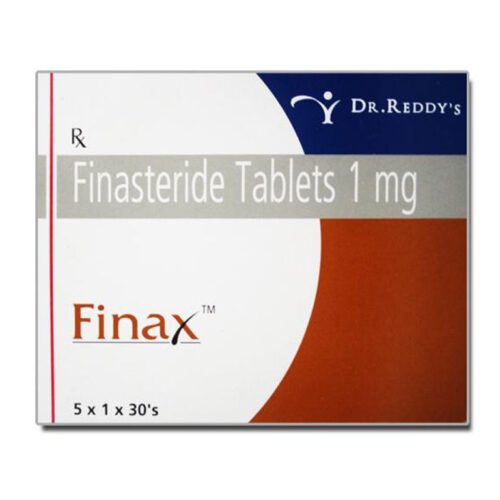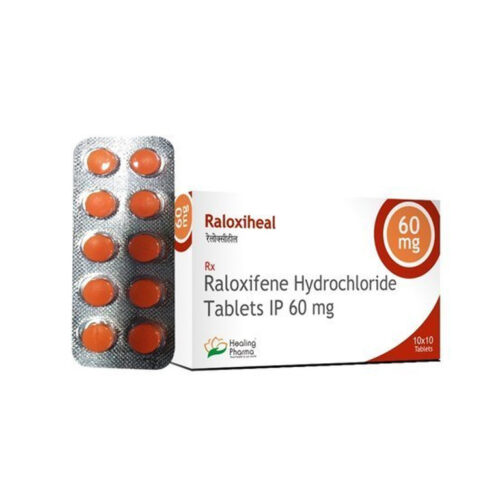Description
What is Meprate® Tablet?
Meprate® 10mg Tablet is similar to the progesterone hormone naturally produced by the body. It regulates periods, stops irregular bleeding, and helps with withdrawal bleeding in cases of amenorrhea (unusual stopping of menstrual periods). Meprate 10mg Tablet is a progestin (female hormone). It works by replacing the natural progesterone hormone that the body is unable to make. This treats painful, irregular, or absent menstrual periods. It also prevents an overgrowth of the lining of the uterus in menopausal women taking estrogen (another female hormone).
- In abnormal uterine bleeding: Meprate 10mg Tablet is a synthetic progestin that replicates the effect of a natural female hormone called progesterone. It slows the growth of the lining of the womb before menstruation, which reduces the bleeding during menstruation. If heavy periods become such a problem that they interfere with your everyday life, then try taking things a little easier on those days. Some women find that relaxation techniques or yoga help them feel more relaxed and reduce stress. Getting a lot of exercise can also help.
- In amenorrhea: Meprate 10mg Tablet contains progesterone, a female hormone that is important in the regulation of ovulation and menstruation. It is used to cause menstrual periods in women who have not reached menopause but are not having periods due to a lack of natural progesterone in the body. You should use the medicine as prescribed for it to be effective. Avoid any stress and follow your doctor’s instructions carefully. Improving weight and nutrition may be recommended in females with eating disorders or malnutrition to get the maximum benefit from Meprate 10mg Tablet.
Progestin is a hormone produced by the ovary in the post-ovulatory half of the menstrual cycle. The term Progestin by itself means that which favors pregnancy. From this its most basic function is derived, in that, progestin is a substance that converts the estrogen primed womb (endometrium) into a secretory state to promote the continuation of pregnancy should it occur.
The secretory or soggy endometrium is also able to shed easily in the absence of gestation. Progestins have been synthesized artificially since the 1950s; they have undergone numerous advancements through generations and today we have the fourth generation in vogue. We also have in stock Yasmin Birth Control Pill which is another combination tablet used for the same indications.
Meprate® tablet is an example of one such synthetic progestin – Medroxyprogesterone. Albeit a first-generation type, Meprate® still finds useful applicability in many disorders of women’s health ranging from dysfunctional uterine bleeding to hormonal therapy in cancer.
Meprate® 10mg tablets are marketed by Serum Institute of India and contain the formulated salt of the first generation progestin Medroxyprogesterone. Medroxyprogesterone Acetate (MPA) is the active ingredient of Meprate®. Meprate® tablets are sold in blister packs of ten tablets with two different dosage strengths the 2.5mg and the 10mg.
How do Meprate® tablets work?
Pharmacodynamics and Mechanisms of Clinical Actions of Meprate®. Although Progestins are used most commonly as part of the oral contraceptive pill, Medroxyprogesterone in its oral form is not generally available for this purpose as better potent and newer progestin agents are preferred instead. Progesterone finds various actions in the female genital apparatus. It causes mammary gland proliferation to prepare the breast for lactation.
In the cervix, watery cervical secretions are made viscid and impenetrable to sperm entry. A subsidiary contraceptive action of synthetic progestins used in pills. Above all, in the uterus, Progesterone brings about secretory changes in a previously estrogen primed endometrium by increased blood flow, gland tortuosity, and secretions from them.
Removal of progesterone results in the shedding of such a secretory endometrium (womb lining) resulting in menses. Along the same lines, artificial menses also termed “withdrawal bleeding” occurs when an exogenously administered progestin like Meprate® is given for a period of time say from five to fifteen days, and then stopped.
With prolonged exposure to continuous progesterone as with long-term injectable preparations of Medroxyprogesterone, the womb lining gets soggy or spongy (decidualized) and is highly unfavorable to the implantation of any pregnancy, wherefrom comes the contraceptive benefit of such a depot formulation.
LH & FSH are two brain-based hormones that are tightly controlled in a coordinated hormonal feedback loop of action with ovarian estrogen/progestin. When Medroxyprogesterone is used either as a tablet or as an injectable, it suppresses LH/FSH severely which in turn blocks ovarian estrogen production. This effect becomes more pronounced with time, reaching near menopausal effects with total loss of endogenous estrogen. Such a state is vital in managing cancers that are dependent on endogenous estrogens such as tumors of the breast, uterus, and kidney among others.
Meprate® Dosage – Modalities and Instructions
The dose of Meprate® depends upon or varies with the clinical situation it is used in. In dysfunctional uterine bleeding, anywhere from 2.5 to 5 or even 10 mg a day, in single or divided doses is used in the latter half of the menstrual cycle.
In HRT or Hormone Replacement Therapy, 2.5mg daily is used in the latter half of the cycle.
In Cancer prophylaxis or palliative treatments, higher doses are employed, and these are in the ranges from 300 mg to even 1.5 grams per day depending upon the type of tissue. Higher-strength formulations of 100mg per tab from different brands such as Deviry are available.
Clinical Applications, Uses, and Indications of Meprate® Tablets
- Dysfunctional Uterine Bleeding: Meprate® is used in the second half of the ovulatory cycle. This phase is called the luteal phase and many women are deficient in progestin levels in this phase, leading to improper menstrual cycles or flow. Used from day 16 to day 25 of the cycle serves to correct dysfunctional cycles. Menorrhagia or heavy periods also benefit from such treatment, especially if given in such a manner, cyclically over three to six months. The presence of estrogens in the first half of the cycle makes the treatment more efficient in reducing menstrual pains and quantum of flow, thereby relieving dysmenorrhea and Iron deficiency anemia (from the excessive blood loss).
- Secondary Amenorrhoea: It is the absence of periods for six months or more in a woman who has otherwise menstruated regularly and is not in the vicinity of menopause. Such a condition can arise from various causes ranging from stress, anorexia, and over-exercising to thyroid or pituitary problems. Elicitation of the cause is foremost but once this is done, Meprate® plays the important role of restoring a period in such women in the form of a withdrawal bleed.
- HRT (Hormone Replacement Therapy): In women with an intact uterus, the presence of Meprate® in the latter half of the cycle in combination with low dose estrogens used in the first half is absolutely essential as part of Hormone replacement therapy. The reason being Meprate® prevents the excessive and unopposed stimulation of the womb endometrium preventing malignant changes.
- PCOS (Polycystic Ovary Syndrome): This is a disorder that is fairly common in the present day. It is characterized by a gamut of signs and symptoms, prominent among which are Anovulation, Oligomenorrhoea, and Infertility. Women who suffer from Polycystic Ovaries benefit from resetting to a state of regular periods and suppression of their androgen levels. Meprate® helps in restoring periods in these women as well as preventing the unregulated thickening of the womb lining in such cases.
- Endometriosis: This is a condition caused by the presence of ectopic endometrium outside the uterus anywhere in the pelvic tissues. It is dominated by problems of painful periods (dysmenorrhea) and Infertility. Continuous administration of Meprate® /Progestins can create a state of near-total menopause or artificially induced gonadal atrophy which suppresses endogenous estrogen production indirectly through suppression of the central gonadotropins (LH/FSH). Meprate® is one modality of treatment in the array of agents available to combat endometriosis.
- Endometrial Hyperplasia: This is a premalignant lesion of the womb lining or endometrium and Meprate® forms a successful modality of medical management in simple hyperplasia of the endometrium. Meprate® was given from 10 to 20 mg per day or cyclical 12 to 14 days a month is beneficial in reversing this condition in a number of women. Although Mirena and Megestrol are better alternatives in complex or atypical hyperplasia.
- Cancer Treatment: Meprate® is used as part of the hormonal treatment of PR + ve (Progesterone receptor expressive) Breast Cancer. MPA may be used albeit in much higher doses for the palliative treatment of late-stage endometrial, prostatic, and renal cancers.
Side Effects of Meprate® Tablets
The possible side effects of Meprate® tablets are temporary and often easily managed. The side effects of Medroxyprogesterone vary greatly with the dose and the form they are used with. Injectable depot preparation (Depot Provera) and higher doses used in cancer management protocols have a higher chance of adverse reactions than Meprate® used in 2.5 or 10mg doses for short periods for dysfunctional uterine bleeding or secondary amenorrhoea.
- Irregular intermittent spotting while on therapy is termed as “breakthrough bleeding”.
- Tendency to temporary Infertility on prolonged usage is noted.
- Acne, Hirsutism, Alopecia
- Rash, Urticaria
- Nausea, vomiting, Diarrhea
- Muscle pains or cramps
- Breast engorgement/fullness, Pelvic infections, and cervical erosions.
- Palpitations, Hypertension, Thrombosis, Myocardial Infarction, Stroke.
Adverse Reactions and Disadvantages of Meprate® Tablets
Teratogenicity in the form of webbed toes and fingers, masculinization of female infant genitalia, and Low birth weight babies are reported in women who take Meprate® while they are unaware of, or not investigated for pregnancy.
Progestins promote fluid retention and weight gain and Meprate® is no exception. The amount of weight gained is mostly proportional to the duration of therapy.
Increased glucose intolerance and raised blood sugars are known.
Breast cancer may be a possibility when used for long periods of time of more than 2 years especially when used by younger women in the 25 -35 age group.
Interactions and Interference with Meprate® Treatment
Important medicines that reduce the effectiveness of Meprate® include the following drugs like aminoglutethimide, griseofulvin, rifampin, phenobarbital, phenytoin, and carbamazepine are known enzyme inducers that will reduce the efficacy of MPA.
Caution, when used for contraception, is advised with these agents. Plasma gonadotropin assays, urinary steroid assays, and coagulation profiles may be deranged while on MPA.
Contraindications And Precautions With The Use Of Meprate®
Meprate® must not be used in the following situations and care should be taken were advised to obtain medical consultation in any of these scenarios:
- Allergic or hypersensitive to MPA (Medroxyprogesterone Acetate)
- Suspected pregnancy, undiagnosed vaginal bleeding, irregular periods/unsure dates.
- Suspicious breast lumps, high risk for breast cancer, diagnosed breast cancer.
- High risk for blood clotting disorders, thrombotic events, thromboembolism, stroke, uncontrolled high blood pressure, etc.
- Preexisting medical conditions such as epilepsy, seizures, and migraine warrant medical advice prior to taking Meprate®.
- Chronic Liver or Kidney or Adrenal disease.
- A Pap smear and or colposcopy is advisable in women with cervical lesions or high-risk factors for cervical cancer or intraepithelial neoplasia.
Buy Meprate®Tablets Online Cheap OTC
You can buy Meprate® tablets online from Tropic Pharma, Meprate® pills are available for only $22 per 30 tablets.

